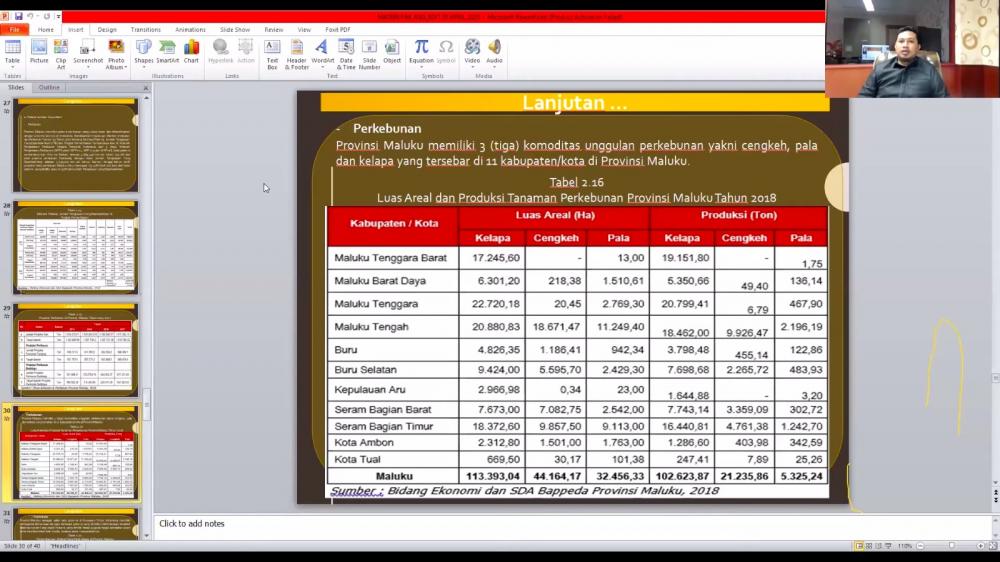Webinar Series #5: Socio-Economic Conditions of Eastern Indonesian Society and Measuring Its Resilience to the Covid-19 Crisis

Webinar Series #5 is part of the 2nd Round Webinar Series organized by the Islamic Financial Management Program at UIN Sunan Kalijaga. The event was moderated by Mr. Izra Berakon, a lecturer from the Islamic Financial Management Program at UIN Sunan Kalijaga. Webinar Series #5 took place on Monday, April 20, 2020, from 10:00 AM to 11:30 AM. The theme for this webinar was "Socio-Economic Conditions of Eastern Indonesian Society and Measuring Its Resilience to the Covid-19 Crisis: A Study of Maluku Province." Mr. Abdullah Asis Sangkala, Vice Chairman of the Maluku Provincial DPRD, was the speaker for this webinar.
Mr. Izra, as the moderator, opened the event by emphasizing its purpose: to update participants and the public on the conditions of the Maluku region, specifically Eastern Indonesia. He highlighted the need to focus on areas beyond immediate surroundings, as each region has policies to protect its residents from the ongoing Covid-19 pandemic, affecting various sectors such as economy, society, and culture.
During the webinar, the speaker provided information on the Covid-19 situation in Maluku Province as of April 17, 2020. There were 23 confirmed cases, with the first case reported in mid-March. Six individuals had recovered, but concerns were raised about the region's healthcare facilities' capacity. The provincial government and the public expressed doubts about the adequacy of treatment and facilities in Maluku. Despite these concerns, some patients, including a 74-year-old, had successfully recovered. Currently, 17 individuals remained positive for Covid-19. Notably, five of these positive cases were quarantined but not hospitalized, as their health conditions were stable. Additionally, Maluku had seven Persons Under Supervision (PDP) and 105 individuals under Monitoring (ODP).
To address the Covid-19 situation, the Maluku provincial government prepared seven referral hospitals. Some of these include RSU Dr. M Haulussy Ambon, RSUP dr. J. Leimena, and RSUD Dr. P. P. Margaretti Saumlaki. The Covid-19 pandemic's epicenter was Ambon City, with cases initially linked to individuals traveling from outside the city. Local transmission had also occurred, impacting family members of confirmed cases. Due to the substantial number of cases, the provincial government, along with the central government, decided to implement Regional-Scale Social Restrictions, specifically in Ambon City and its surrounding areas.
To further control the spread of the virus, the provincial government temporarily restricted people from entering Maluku through its ports for two weeks, from April 17, 2020, to May 4, 2020. This measure applied to individuals from Java, Jakarta, Makassar, and Southeast Sulawesi. Additionally, at the airport, all incoming individuals, both natives and newcomers, were required to undergo a 14-day self-quarantine.
Considering the socio-economic conditions of Maluku, the speaker provided insights into its economic growth, which had been stable at 5-6% in the last five years. However, due to the impact of Covid-19, the economic growth forecasted for Maluku was expected to be only 2-3%. The province's economy is heavily reliant on sectors such as agriculture, fisheries, and forestry, as the majority of Maluku's population works as farmers and fishermen. The inflation rate in Maluku was 3%, possibly influenced by the region's high consumption rate. The per capita income in 2018 was Rp24,000,000. The Covid-19 pandemic was anticipated to increase the percentage of the population classified as near-poor or poor to approximately 40% of the 1.8 million residents.
Education in Maluku was reported to be of low quality, ranking fourth from the bottom nationally. The health sector faced challenges, with ongoing efforts to improve services. Despite the limitations, Maluku has potential in various sectors, with fisheries being its most significant strength. The province contributes about one-third of the national fishery resources, and it has a total annual fishery resource potential of 4.6 million tons or 37.2% of the national total.
In response to the economic challenges posed by Covid-19, the provincial government planned to implement serious measures. The socio-cultural resilience of Maluku's people, rooted in strong social bonds and tolerance, was considered a valuable asset in facing the crisis. However, the government acknowledged the need to accompany the population through the crisis. With a 50% reduction in the Regional Budget (APBD) by the Ministry of Finance, the Maluku provincial government planned to allocate funds for Covid-19 handling, social safety nets, and labor-intensive projects. Additionally, the government intended to provide Direct Cash Assistance (BLT) and other economic assistance to the community.
In conclusion, the webinar shed light on the challenges and potential strategies to address the economic impact of Covid-19 on the people of Maluku. The discussion highlighted the importance of governmental support, community engagement, and the leveraging of natural resources to navigate these challenging times.
Authors: Amy Astriana, Aulia Nurul Safitri
